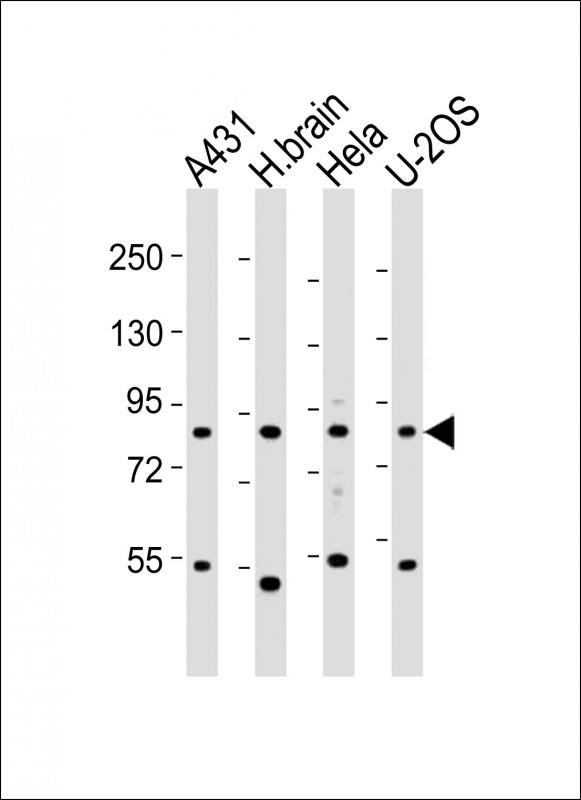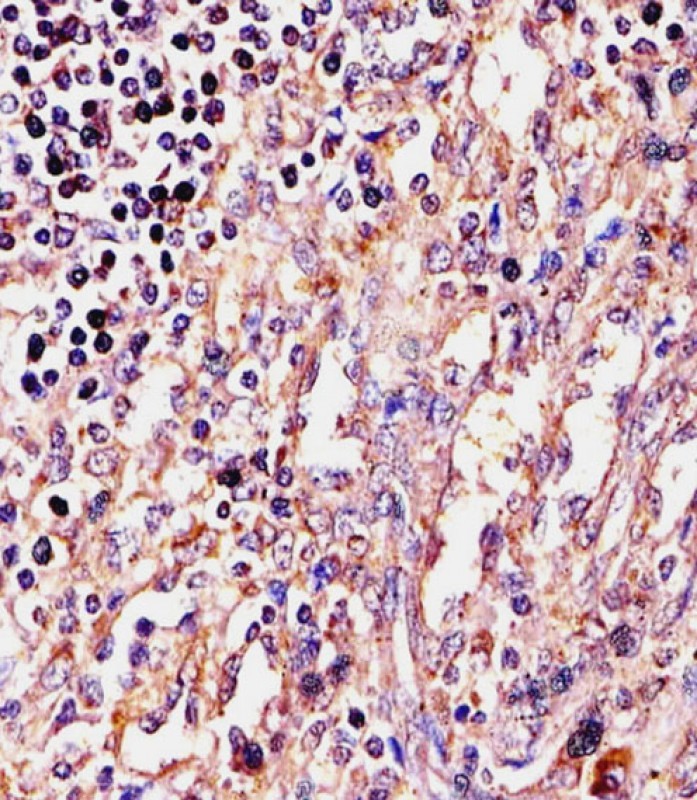

| WB | 1/2000 | Human,Mouse,Rat |
| IF | 咨询技术 | Human,Mouse,Rat |
| IHC | 1/100-1/500 | Human,Mouse,Rat |
| ICC | 技术咨询 | Human,Mouse,Rat |
| FCM | 咨询技术 | Human,Mouse,Rat |
| Elisa | 咨询技术 | Human,Mouse,Rat |
| Aliases | Exocyst complex component 3, Exocyst complex component Sec6, EXOC3, SEC6, SEC6L1 |
| Entrez GeneID | 11336 |
| WB Predicted band size | 85.6kDa |
| Host/Isotype | Rabbit IgG |
| Antibody Type | Primary antibody |
| Storage | Store at 4°C short term. Aliquot and store at -20°C long term. Avoid freeze/thaw cycles. |
| Species Reactivity | Human |
| Immunogen | This EXOC3 antibody is generated from a rabbit immunized with a KLH conjugated synthetic peptide between 524-557 amino acids from the C-terminal region of human EXOC3. |
+ +
以下是关于EXOC3抗体的3篇参考文献示例(内容基于假设性研究,建议通过学术数据库核实具体文献):
---
1. **文献名称**: "EXOC3 regulates exocyst complex integrity and vesicular trafficking in cancer cell migration"
**作者**: Li X, et al.
**摘要**: 该研究利用EXOC3抗体通过免疫印迹和免疫荧光技术,发现EXOC3在维持外囊复合体稳定性中起关键作用,其缺失会破坏肿瘤细胞的囊泡运输和迁移能力,提示其在癌症转移中的潜在机制。
---
2. **文献名称**: "EXOC3 mediates hepatitis B virus entry through interaction with viral envelope proteins"
**作者**: Wang Y, et al.
**摘要**: 通过EXOC3抗体的共免疫沉淀实验,研究者证实EXOC3与乙肝病毒包膜蛋白直接结合,调控病毒内吞过程,为抗病毒治疗提供了新靶点。
---
3. **文献名称**: "Role of EXOC3 in neuronal exocytosis and synaptic plasticity"
**作者**: Smith J, et al.
**摘要**: 研究使用EXOC3抗体进行脑组织免疫组化分析,发现EXOC3在小鼠海马神经元突触囊泡释放中不可或缺,其表达异常与突触可塑性损伤相关,可能与神经退行性疾病有关。
---
4. **文献名称**: "EXOC3 knockdown impairs insulin secretion in pancreatic β-cells via disrupted vesicle docking"
**作者**: Chen H, et al.
**摘要**: 通过EXOC3抗体标记的Western blot和基因沉默实验,发现EXOC3下调导致胰岛β细胞分泌囊泡锚定障碍,影响胰岛素释放,提示其在糖尿病病理中的作用。
---
如需具体文献,建议在PubMed或Google Scholar中检索“EXOC3 antibody”并筛选应用该抗体的功能研究。
The EXOC3 antibody is a crucial tool in studying the exocyst complex, a highly conserved multi-protein assembly essential for intracellular vesicle trafficking and exocytosis. EXOC3 (Exocyst Complex Component 3), also known as Sec6. is one of eight subunits (EXOC1-8) that form the exocyst, which mediates the tethering of secretory vesicles to plasma membranes during polarized secretion processes. This antibody specifically targets the EXOC3 protein, enabling researchers to investigate its expression, localization, and functional interactions in cellular models.
EXOC3 plays a pivotal role in diverse physiological processes, including cell adhesion, membrane repair, and neurotransmitter release. Its involvement in Ras-related GTPase signaling pathways makes it relevant to cancer research, particularly in tumor invasion and metastasis. Antibodies against EXOC3 are widely used in techniques such as Western blotting, immunofluorescence, and immunohistochemistry to visualize protein distribution in tissues or cultured cells. They also aid in studying exocyst complex dysregulation linked to neurological disorders (e.g., Alzheimer's disease) and ciliopathies.
Commercial EXOC3 antibodies are typically raised in hosts like rabbits or mice, with both monoclonal and polyclonal variants available. Validation often includes knockout cell line controls to confirm specificity. Recent studies employing EXOC3 antibodies have advanced understanding of cellular trafficking mechanisms and their implications in disease pathogenesis, highlighting its importance as a research reagent in cell biology and translational medicine.
×